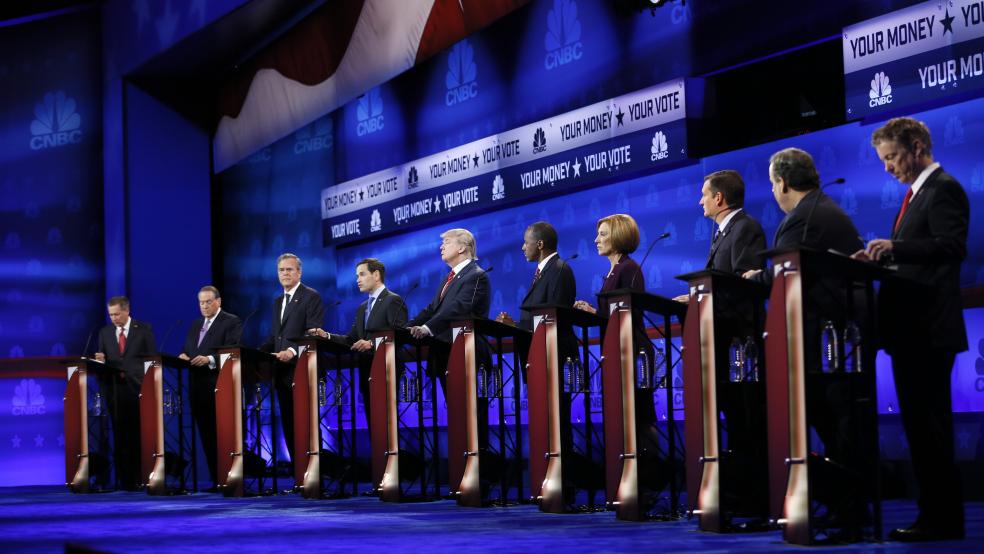It's such a simple idea: A single tax rate for individuals, rich and poor, and companies, big and small.
"Everybody should pay the same proportion of what they make," said Republican presidential hopeful Ben Carson in Tuesday's latest candidate debate. "You make $10 billion, you pay a billion. You make $10, you pay one."
Related: Fact Checkers Working Overtime: Top Whoppers from the GOP Debate
But like everything else in the sprawling, $18 trillion U.S. economy, the math isn't quite that simple. And, while the idea is hardly new, the current round of proposals simply don't add up.
Aside from their obvious simplicity, the latest flat tax proposals are being pitched as a broad tax cut for the middle class. But, in fact, most Americans would end up paying a greater share of their income — except the very rich.
That's because — under the current system — those at the bottom of the income ladder pay a much smaller share of their income than those at the top.
A 2011 Congressional Budget Office study, for example, found that American households in the lowest fifth of the income ladder paid about 2 percent of their income in federal taxes. The top fifth paid 21 percent of their total income and the top 1 percent paid 29 percent.
Related: Trump Gets Thumped in Fourth GOP Debate
So if a flat tax hit all households with, say, a 15 percent rate that would mean taxes on the bottom fifth would increase more than sevenfold, while the top 1 percent would see their taxes cut almost in half.
To get around that, some flat tax proposals would boost the threshold a household could earn tax-free. GOP candidate Sen. Ted Cruz has proposed leaving the first $36,000 untaxed and fellow Republican hopeful Sen. Rand Paul wants to leave the first $50,000 untaxed. But that would still represent a huge tax cut for those on higher rungs of the income ladder.
"The flat-taxers like to run around with Lake Wobegon economics where we are all going to pay less and still have the same amount of money, but the world doesn't work that way," according to Dean Baker, co-founder of the Center for Economic and Policy Research, in a U.S. News & World Report blog post.
That's one of the main criticisms of the flat tax proposals: They wouldn't bring in nearly enough money to pay the government's bills, swelling the national debt with huge budget deficits that most of the GOP candidates have pledged to eliminate.
Related: Christie Looks Past GOP Rivals in Undercard Debate to Focus on Clinton
So far, four of the GOP candidates have proposed flattening the tax system to a single rate, all of which would eliminate trillions of dollars in tax revenue needed to balance the federal budget. Carson, who originally proposed a flat 10 percent on personal and business income, has recently upped that to 15 percent.
But, as CNBC's Becky Quick noted in the Oct 28 debate, the proposal would leave a roughly $1 trillion hole in the federal budget, an analysis confirmed by Politifact, a website devoted to fact-checking candidate claims.
The math underpinning the other candidates' flat tax proposals are equally problematic, according to the Tax Foundation analysis.
Cruz, for example, has called for a 10 percent flat tax on personal income and a 16 percent tax on businesses.
Related: Why Rubio Is the Likely GOP Nominee
"The revenue loss under this plan, using reasonable rather than insane estimating assumptions, would be absolutely staggering," according to a blog post by New York University law professor Dan Shaviro, who has written about tax policy.
Other researchers agree. An analysis by the Tax Foundation, which Cruz has cited, found that his flat tax proposal would create a $3.6 trillion shortfall over the next decade.
Paul wants a flat 14.5 percent tax on personal and business income, a plan that would lose $1.8 billion over 10 years, the Tax Foundation found. Even at a 20 percent flat tax rate, former Pennsylvania U.S. Sen. Rick Santorum's tax plan would come up short by $1 trillion, according to the research group.
The candidates argue that the deep losses in revenue would be offset because tax cuts would spur growth and create more jobs which, in turn, would generate more taxes. But that assumption doesn't take into account the impact of larger federal budget deficits or potential spending cuts on the overall economy. (Widening deficits would almost certainly increase pressure to cut government spending, which would create a drag on economic growth.)
Related: New Jersey Voters Have a Message for Christie: ‘Come Home’
While the flat tax plans don't add up, the other GOP candidates' tax proposals don't hold up any better. The Tax Foundation's recent analysis estimated a $10 trillion budget shortfall over 10 years fromDonald Trump's plan. Former Florida Gov. Jeb Bush's tax plan would leave a $1.6 trillion revenue gap; Louisiana Gov. Bobby Jindal's plan would create a $9 trillion revenue deficit.
In response, many of the candidates argue that multitrillion-dollar tax shortfalls could be offset by major cuts in government spending. Paul has said repeatedly he wants "a government so small I can hardly see it."
But few of the candidates' tax proposals even hint at where those spending cuts would come from. (On Tuesday, Cruz said he would simply eliminate five government departments altogether.)
One of the more popular government agencies targeted for elimination is the Internal Revenue Service, which Paul and Cruz have promised to shutter if elected.
While the idea may be popular with many voters, it's just not realistic, according to Kyle Pomerleau, a Tax Foundation researcher who has analyzed the candidates' tax plans.
"At its core, the IRS is the agency that collects taxes," he said recently in a blog post. "As long as the government collects taxes, some agency will exist to carry out that task."
This article originally appeared on CNBC. Read more from CNBC:




